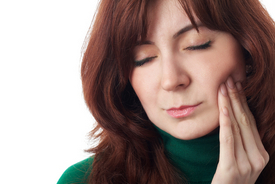The Dangers of Bruxism
By John Rink DDS on July 17, 2013
 Bruxism, commonly known as teeth grinding, is a serious condition, which, if left untreated, can lead to major dental problems. Fortunately, bruxism is treatable and there are many cosmetic dentistry procedures to repair the damage caused by teeth grinding. For your personalized treatment plan, we invite you to schedule a consultation with Dr. John F. Rink. In the meantime, read on to learn about the dangers of bruxism and the treatments available to stop the damage.
Bruxism, commonly known as teeth grinding, is a serious condition, which, if left untreated, can lead to major dental problems. Fortunately, bruxism is treatable and there are many cosmetic dentistry procedures to repair the damage caused by teeth grinding. For your personalized treatment plan, we invite you to schedule a consultation with Dr. John F. Rink. In the meantime, read on to learn about the dangers of bruxism and the treatments available to stop the damage.
The Dangers of Bruxism
Bruxism is actually a quite common condition, affecting most sufferers during sleep. Some causes of teeth grinding are believed to be increased stress and malocclusion. If left untreated, bruxism can lead to serious dental problems, including tooth loss. The dangers of bruxism include:
- Loss of tooth enamel: Constant grinding of the teeth gradually wears down the protective outer layer of the teeth, called the enamel. When the enamel is lost, the teeth become more vulnerable to sensitivity and decay.
- Fractured teeth: Bruxism can lead to fractures as a result of the strain teeth grinding puts on the teeth.
- Gum recession: Teeth grinding can cause gum recession.
- Loose teeth: Regular teeth grinding can cause the teeth to loosen in their sockets.
- Tooth Loss: Tooth loss can result from chronic bruxism for a number of reasons. In severe cases, the teeth may be ground down to small nubs, possibly requiring extraction. The teeth may be lost to decay as a result of destroyed enamel, or they may fall out due to a loosening of the tooth root.
- Headaches, neck pain, and jaw pain: Teeth grinding generally involves the clenching of the jaws, which puts great stress and pressure on the jaw joints. For some, this strain may cause dull headaches, neck pain, or jaw pain.
- Worsen or cause TMD: TMD, or temporomandibular joint disorder, can be caused or exacerbated by bruxism due to the pressure teeth grinding puts on the jaw.
- Causes sleep problems: For most bruxism sufferers, teeth grinding occurs during sleep, which can make sleeping difficult. In some instances, teeth grinding can disturb the sleep of a partner due to the sound of teeth grinding.
Treating Bruxism
Bruxism can lead to many serious problems, but it doesn't have to. Here are just a few treatment options to help alleviate the symptoms of bruxism, restore dental health, and prevent further damage.
- Custom mouth guards: Mouth guards are comfortable, custom made trays worn over the teeth during sleep and are one of the best treatments for protecting the teeth from its damaging effects and alleviating the muscular pain associated with bruxism.
- Orthodontics: In some cases, teeth grinding is caused by malocclusion, or poorly aligned teeth. Orthodontics can help treat bruxism caused by a bad bite by correcting the alignment of the teeth.
- Stress reduction: Teeth grinding caused by stress can be reduced by practicing stress reducing activities like yoga, meditation, and walking.
- Restorative dentistry: There are many restorative dentistry treatments, like dental bonding, dental crowns, and dental implants.
Seek Treatment Today!
Don't let bruxism go untreated. Schedule a consultation today!

